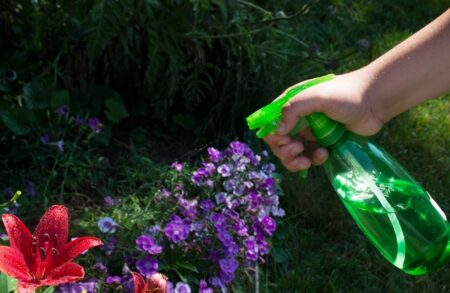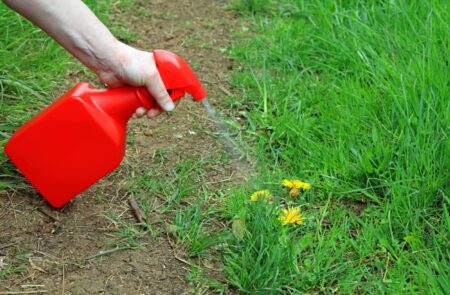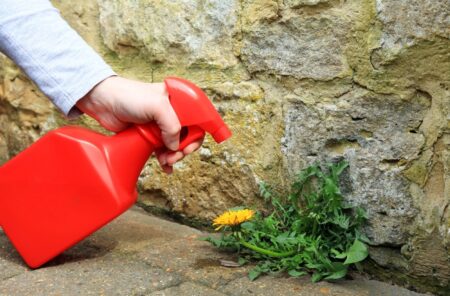Weed Killer Safe For Pets
Weed killers can be a great asset to your lawn and garden if used correctly. But, most commercial weed killers are highly toxic and can pose a serious threat to pets. However, there are pet-safe weed killers available that are safe to use around animals if applied properly. Here is a brief introduction to the different types of pet-safe weed killers and how they can help keep your pet safe from the dangers of toxic chemicals.
Weed Killer Safe For Pets
Weed killer is an important tool in both home and professional gardening. However, using weed killers around pets can be a problem because most pet owners don’t want to expose their beloved family members to potentially toxic chemicals. There are several types of pet-friendly weed killers available that are non-toxic and safe for use around pets. These include natural types of weed killers like vinegar, salt, and other homemade weed killers, as well as designed specifically for pet-safe weed killers.
Are Herbicides And Weed Killers Safe To Use Around Dogs?
Herbicides and weed killers can be safe to use around dogs, provided they are used properly and according to the instructions listed on the product label. When using any type of pesticide, it is important to make sure that the application is done in a way that ensures the dog doesn’t get into contact with the pesticide. This means avoiding the use of the product near areas of the yard that your dog frequents, such as lawns, dog beds, and walking areas. Additionally, it is important to wash off any residual pesticide products from boots, gardening gloves, or other items that may come into contact with your dog.
Weed Killer and Pets: What to Know
Weed killers can be dangerous for pets if ingested or if they come into contact with the chemical. Pets may lick or eat plants that have been treated with weed killers, potentially leading to poisoning. To avoid any potential pet health risks, pet owners should be sure that treated areas are clearly marked and inaccessible to their pets. Additionally, pet owners should use pet-safe materials to protect their pet’s skin and fur from coming in contact with weed killers. Pet owners should always follow the instructions listed on the product label and be sure to use any protective gear such as gloves that may be recommended.
Weeding Solutions That Are Always Pet-Safe
- Hand weeding: Hand weeding can be a great way for pet owners to get rid of weeds without introducing any chemicals or hazardous materials into the environment that could potentially harm their pets.
- Mulching: Using mulch (e.g. bark or wood chips) as a weed barrier can discourage new weed growth while providing your pet with a safe place to play and explore.
- Boiling Water: Boiling water poured directly onto the weeds is a great, pet-safe alternative to chemical herbicides and can be extremely effective at killing weeds quickly and easily.
- Vinegar: Applying vinegar to weeds is a great way to kill weeds safely and quickly without introducing chemicals into the environment that could be harmful to pets.
- Salt: Sprinkling salt over weeds helps to prevent weed growth, and it won’t harm your furry friends if they happen to come into contact with it.
When Is It Safe For Pets After Spraying Weed Killer?
Generally, it is safe for pets to be around areas where weed killer has been used after it has dried completely and is no longer active, usually 1-3 days after spraying. However, it is important to read all instructions of the product before using it and keep pets away from the area until it is safe.
How Long Is Weed Killer Toxic To Dogs?
Most weed killers contain active chemicals that can be toxic when ingested by dogs. The specific toxicity of a particular product will depend on the concentration and type of active ingredient and the amount consumed by the dog. Generally, weed killers are only considered toxic for up to 24 hours after application; however, if your dog has ingested a large quantity, it may be necessary to take them to a veterinarian for evaluation and possible treatment.
Symptoms Of Weed Killer/Herbicide Poisoning
Symptoms of herbicide or weed killer poisoning can include:
- Skin Irritation: Exposure to certain herbicides or weed killers can cause skin irritation including redness, itching, and a burning sensation.
- Eye Irritation: Eye irritation from herbicides or weed killers may cause redness, swelling, pain, and watering eyes.
- Respiratory Problems: Ingestion or inhalation of high concentrations of herbicides or weed killers can cause difficulty breathing, coughing, chest tightness, and wheezing.
- Nausea and Vomiting: Ingestion of certain herbicides or weed killers may cause nausea and/or vomiting.
- Headache: Exposure to certain herbicides or weed killers may cause headaches.
- Lethargy and Fatigue: Difficulty waking up in the morning or feeling tired throughout the day is a potential symptom of herbicide or weed killer poisoning.
- Confusion and Disorientation: Ingestion of certain herbicides or weed killers may cause confusion, disorientation, confusion, or difficulty concentrating and remembering.
Pet-Friendly Weed Killer
- Ortho Weed-B-Gone Max Plus Crabgrass Control: This pet-friendly weed killer uses an active ingredient called Trimec-Sulfentrazone. This active ingredient targets surface weeds and help to control crabgrass and other grassy weeds. It is safe for use around pets and is also safe to use in areas where there are pets and children present.
- Scotts Turf Builder Weed & Feed3: This pet-friendly weed killer contains three active ingredients: Dicamba, 2,4-D, and Mecoprop-P. It helps to kill surface weeds and maintains a lush, green lawn. It is safe to use around pets, children, and other wildlife.
- Scotts EcoSense Weed B Gon: This pet-friendly weed killer is made with a natural formulation of vinegar and other natural ingredients. Its active ingredient is acetic acid, which targets weeds without harm to the environment or pets. It is safe to use around children and pets and can even be used directly on flowers and vegetables.
- BioAdvanced All-In-One Lawn Weed & Crabgrass Killer: This pet-friendly weed killer contains three active ingredients: dicamba, 2,4-D, and Mecoprop-P. It is formulated to kill weeds and crabgrass quickly and effectively without harming lawns or plants. It is also safe to use around pets, children, and wildlife.
What to Look For in Pet-Safe Weed Killer
First, when selecting pet-safe weed killers, it is important to purchase a product that is specifically formulated to be safe for pets. Check the packaging carefully and look for ingredients such as citric acids and other natural or organic ingredients, which are generally safer for pets. Also, opt for a granular or pellet-based weed killer for an easier spot treatment that won’t inadvertently harm your pet or beneficial insects. Finally, make sure the product is safe to use in terms of application, and read the instructions carefully. For instance, be aware that misting and spreading a weed killer can bring it into contact with pets, so consider diluting the product and spot spraying to reduce the risk.
Key Ingredients to Avoid in Weed Killer
There are several ingredients to avoid when looking for a weed killer, such as glyphosate, 2,4-D, dicamba, hexazinone, and metolachlor. As a responsible consumer, it is important to read the ingredient labels on weed killers to avoid any additives that are linked to harming the environment or humans. Avoiding the above-mentioned chemicals, a list of ingredients to look for when buying a weed killer includes abundant natural ingredients, such as vinegar, citric acid, and clove extract.
Where To Buy Pet-friendly Weedkillers
One great place to buy pet-friendly weedkillers is Amazon.
Can You Make A Homemade Pet-Safe Weed Killer?
Yes, it is possible to make a pet-safe weed killer. You can mix one gallon of vinegar, two cups of lemon or orange essence, and a tablespoon of dish soap. Mix these ingredients together in a spray bottle and shake it before use. Spray the solution directly on the weeds and wait for a few days to see the result. Be sure to spot test first and keep pets away from the treated area until it is dry.
SEE ALSO: How Many Chromosomes Do Dogs Have?
Homemade Weed Killer
Ingredients:
- 1 gallon of white vinegar
- 1 cup of salt
- 2 tablespoons of liquid dish soap
Directions:
- In a large container, mix together the white vinegar, salt, and liquid dish soap.
- Stir the ingredients until the salt is completely dissolved.
- Pour the mixture into a spray bottle and thoroughly saturate the weeds with it.
- Allow a few days to pass before assessing the effects.
- (optional) For heavier infestations, a second application may be needed.
Note: Be sure to avoid spraying any desired plants as this weed killer is not selective.
Natural Weed Killer With Vinegar And Dawn Recipe
Ingredients:
- 1 gallon of white vinegar
- 2 tablespoons of liquid Dawn detergent
- 2 tablespoons of table salt
Directions:
- In a large bucket, mix together the vinegar, liquid Dawn detergent, and salt.
- Stir until all ingredients are evenly distributed.
- Fill a spray bottle with the mixture and apply it to areas of unwanted weeds.
- Allow the mixture to sit on the weeds for several hours.
- After several hours, check the area for dead weeds and reapply as needed.
- Once there are no longer any live weeds, clean up any remaining residue.
How to Best Protect Pets from Weed Killers
- Location: The best way to protect your pet from weed killers is to keep them away from any areas that are treated with these products. This means keeping them off lawns and gardens that have recently been treated, as well as away from any standing weeds or vegetation that might have recently been sprayed.
- Proper Warning: Before applying any weed killer, make sure to check the label for instructions on how to keep pets away. Most weed killers require that any pets be kept away from the treated area for several days after the initial application and in some cases you may need to wait longer. Make sure to read the full instructions to ensure that you are following all necessary steps to protect your pet.
- Clothing: If you need to apply weed killer in an area that your pet frequents, be sure to wear protective clothing. This includes long pants, long sleeves, gloves, and a face mask. This will help to protect your skin from any splashes or run-off from the weed killer that could otherwise be absorbed into your skin and transferred to your pet.
- Clean Up: After you are done treating the weeds or grass, be sure to clean up any remaining residue. Even if you have taken all necessary precautions, it is possible that there could still be some weed killer on the ground that was not properly rinsed away. Therefore, it is important to clean up the area afterward to minimize the potential for your pet to come into contact with the weed killer.
- All Natural Products: If you are looking for a way to protect your pet from the dangers of weed killers, you may want to consider using all-natural products. These products are often made from natural ingredients that are plant-based and effective at killing weeds without the same risks as chemical treatments. This is a great way to keep your pet safe while still controlling weeds in your garden or yard.
SEE ALSO: Can Dogs Get Hiccups?
FAQ
Q. Can you spray weed killer with pets?
A. No, it is not safe to spray weed killer with pets around. Weed killers contain various chemicals that can be harmful to both humans and animals if ingested or inhaled, and can also cause skin irritation if it comes in contact with skin. It is best to keep pets out of the area when spraying weed killers and to keep them away from the area until the weed killer has dried and the fumes have dissipated.
Q. Is weed killer harmful to pets after it dries?
A. The answer is Yes. Weed killer can still be toxic to pets even after it has dried. The active ingredients in weed killers can linger in the environment and be ingested through contact with soil or plants. Additionally, pets may be exposed to concentrated sprays, contaminated soil, or weed killer that has been washed off and into a nearby body of water.
Q. Will spraying weeds with vinegar kill them?
A. Yes, spraying weeds with vinegar can kill them. Vinegar is a type of herbicide that can penetrate the waxy coating of a weed’s leaves and cause it to dry out and die. It is especially effective on young, actively growing weeds.
Q. Is Weedman safe for pets?
A. Yes, Weedman is safe for pets as it contains organic, pet-safe, and non-toxic ingredients.
Conclusion
In conclusion, there are some weed killers that are considered safe for pets. These include those specifically formulated for pet-friendly lawns, which contain natural ingredients such as corn gluten meal, vinegar, lemon juice, and dish soap. Always refer to the instructions on the product label when using any weed killer or lawn care product and follow precautions such as keeping pets and children away from treated areas.

